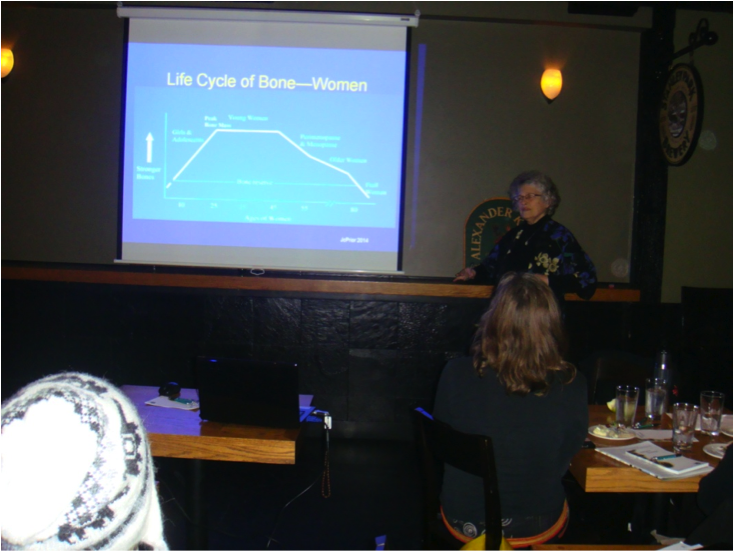IWIS X CIHR Cafe Scientifique: Understanding the Nuts and BONES of Osteoporosis [Event Recap]
Back to Posts
On January 16 2014, IWIS hosted the first Cafe Scientifique to discuss the risk factors and preventive strategies of osteoporosis.
Dr. Jerilynn Prior, a Professor of Endocrinology at UBC, gave a presentation titled “Ovulatory disturbances and understanding how to prevent premenopausal bone loss”. She started her talk by discussing the changes in bone density throughout women’s life. Bone density increases steadily during adolescent and peaks around the age of 25. According to the findings conducted by the Canadian Multicentre Osteoporosis Study, women begin to experience significant bone loss around the age of 45. These changes in bone density are closely related to the changes in the hormones responsible for bone remodeling. The two key hormones involved are estrogen (for bone reabsorption) and progesterone (for bone formation). Dr. Prior then talked about how bone loss is associated with “silent” ovulatory disturbances. A hard-to-notice phenomena since one’s menstrual cycles and estrogen levels appear normal. However, one can still experience bone loss, due to lower levels of progesterone (hormone needed for bone formation and preventing bone loss).
Dr. Prior concluded her talk with the ABCs of osteoporosis prevention. “A” is for “Active”, as exercise is important in preventing bone loss. “B” is for “Brawny” as it is considered that weight loss, will cause increased bone loss. “C” Is For “Calcium”, an essential nutrient for maintaining bone health.
Our second speaker, Dr. Susan Barr, is a Professor of Food Nutrition and Health at UBC. She started her presentation by pointing out the equal importance of nutrition, physical activity and hormones (estrogen and progesterone in particular) in maintaining bone health. Certain nutrients, such as calcium and vitamin D, are extremely important for bones. Foods high in calcium include dairy products, fortified beverages and bony fishes (eg. sardines). She noted that other nutrients in a well-balanced diet are equally important.
Dr. Barr emphasized that calcium supplements can be used to reach recommended daily intake. However, one should be careful not to intake too much calcium, which can increased risks of kidney stones and reduced absorption of other nutrients. In short, food is our best source of calcium. In order to increase calcium absorption, divided doses of calcium taken with meals are recommended.
She expressed the importance of sunlight in Vitamin D synthesis and the role in bone health. Vitamin D can be obtained from foods, such as salmon, tuna and shrimp. This is especially important in Canada, due to the lack of sunlight during autumn and winter seasons.
Our moderator, Mavis Dixon, Manager of Health Projects and Engagement at Ayogo Health, facilitated an interactive question and answer period after each speaker’s talk.
We would like to take this opportunity to thank our speakers, moderator and volunteers. Thank you everyone for participating in this stimulating and exciting discussion. We look forward to seeing you all at our next Cafe Scientifque on February 6. The topic of this event will be “Getting to the HEART of preventing cardiovascular diseases“. Registration is already open so reserve your space!.
Written by Blanca Rodrigue
Edited by Lee Ling Yang
Photo credit: Samaneh Khakshour & Zhila Pirmoradi


other.

other.

Lee Ling Yang (Director of IWIS); Susan Barr (Professor, Food Nutrition & Health, UBC); Jerilynn Prior (Professor, Endocrinology, UBC), Mavis Dixon (Manger, Health Projects & Engagement, Ayogo Health); Samaneh Khakshour (IWIS volunteer).